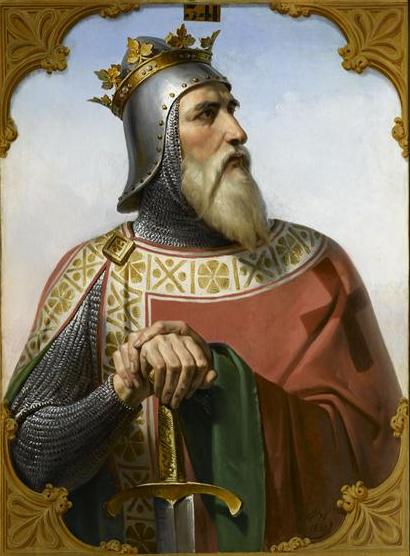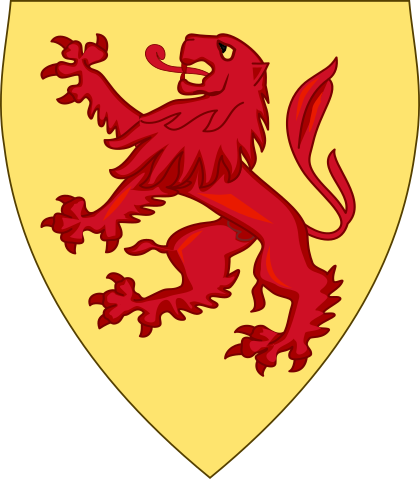Bandits and pirates are great opponents for PCs in almost any genre. Robert Guiscard (1015-1085), a bandit – and later duke! – in southern Italy is a wonderful example of the type. He was a medieval nobody who became an outlaw, and through scheming and pillaging wormed his way into the highest levels of power. He’s a great villain for an RPG adventure!

Robert Guiscard was a Norman: one of the the descendants of the Vikings who conquered northern France in the early 900s and became the region’s aristocrats. By the time Robert was born in 1015, there wasn’t much left to conquer. Robert was an ambitious (and physically enormous) man, and rather than jockey with his cousins for ever-smaller pieces of the Norman pie, he opted to go elsewhere to “seek his fortune through arms”.
When he was 31, Robert organized a band of knightly followers. There weren’t many of them: five mounted, thirty afoot. They left Normandy and traveled overland to southern Italy where they roamed amid the caves and mountains, attacking travelers. In this way, they gained horses, weapons, and plunder. As Robert’s reputation grew, so did the size of his band.
Unfortunately for southern Italy, Robert was blessed with a fierce intelligence. His nickname, Guiscard, translates as ‘the cunning one’ or ‘the weasel’. Chroniclers recount his knack for attacking the wealth of his enemies, rather than their armies. He was brave, tyrannical, and had a voice that “put thousands to flight” when he shouted. He was the perfect petty despot for a savage age.
At the time, southern Italy was cursed with an endless series of mini-wars. Robert learned how to gain an advantage by making them worse. He would fight for one nobleman, then for his rival. He’d find the most powerful nobleman, attack his holdings, and carry off his wealth. And by periodically making himself useful to everybody, he got the nobility to turn a blind eye to his pillaging. In most circumstances, this sort of treachery and banditry would get you killed. In this period of anarchy, though, it allowed Robert to enrich himself while keeping any one aristocrat from growing powerful enough to oppose him. By amassing wealth and keeping the ‘legitimate’ nobles powerless, Robert gradually became the de facto ruler of southern Italy.
In 1059, the Pope officially made Robert the duke of the region he was already ruling. The papacy needed allies, and Robert was only too happy to swear fealty in exchange for recognition. As duke, he waged wars on the Byzantine Empire and on the Moors in Sicily. Interestingly, thanks to these conquests, history remembers the bandit lord Robert the Weasel rather fondly. Italian Catholic historians give us Robert as a righteous sword of Catholicism, not as a scheming bandit who pillaged his way into power. Dante even puts him in heaven in his Paradiso.

Released under a Creative Commons Attribution-Share Alike 3.0 Unported license by The White Lion.
What’s great about basing a bandit NPC on Robert Guiscard is not just that he has an interesting backstory that makes his turn to banditry seem halfway sensible. It’s that he’s a bandit with a countdown clock. Every year that passes, he will grow more powerful. If your PCs fail to deal with him for long enough, he’ll wind up running the region. Let him go longer, he’ll become its legitimate ruler, and eventually a fondly-remembered religious figure.
If the PCs do go after him, he could be a fun recurring villain. Robert is flexible and his aims are long-term. If the PCs crush his bandit gang, he may pop up elsewhere as a mercenary captain. Defeat his mercenary company and he may seize a nearby castle and extract ruinous taxes from the peasants.
If your PCs catch and kill Robert, that might not be the end of their trouble. Robert was not the only Norman carving out territory in southern Italy. Some of his older brothers were there too (Robert even appointed one Count of Sicily), and the eventual result of all these Norman conquests was the founding of the Norman-led Kingdom of Sicily, which ruled almost everything in Italy south of Rome. It only makes sense that the NPC you base on Robert isn’t the only one in the area from his homeland. The forces that drove him to a foreign land probably forced a lot of his countrymen in the same direction. If the PCs kill Robert, they may find a lot of other bandits, mercenaries, and minor nobles keen to take revenge.
–
Source: Mercenaries in Medieval and Renaissance Europe by Hunt Janin and Ursula Carlson






